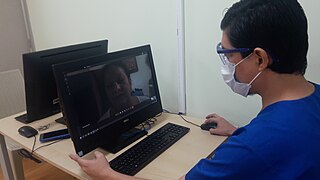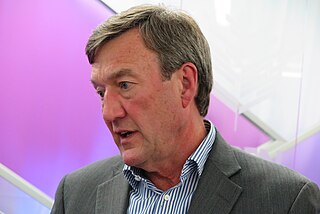Related Research Articles

Beth Israel Deaconess Medical Center (BIDMC) in Boston, Massachusetts is a teaching hospital of Harvard Medical School. It was formed out of the 1996 merger of Beth Israel Hospital and New England Deaconess Hospital. Among independent teaching hospitals, Beth Israel Deaconess Medical Center consistently ranks in the top three recipients of biomedical research funding from the National Institutes of Health. Research funding totals nearly $200 million annually. BIDMC researchers run more than 850 active sponsored projects and 200 clinical trials. The Harvard-Thorndike General Clinical Research Center, the oldest clinical research laboratory in the United States, has been located on this site since 1973.

Telehealth is the distribution of health-related services and information via electronic information and telecommunication technologies. It allows long-distance patient and clinician contact, care, advice, reminders, education, intervention, monitoring, and remote admissions. Telemedicine is sometimes used as a synonym, or is used in a more limited sense to describe remote clinical services, such as diagnosis and monitoring. When rural settings, lack of transport, a lack of mobility, conditions due to outbreaks, epidemics or pandemics, decreased funding, or a lack of staff restrict access to care, telehealth may bridge the gap as well as provide distance-learning; meetings, supervision, and presentations between practitioners; online information and health data management and healthcare system integration. Telehealth could include two clinicians discussing a case over video conference; a robotic surgery occurring through remote access; physical therapy done via digital monitoring instruments, live feed and application combinations; tests being forwarded between facilities for interpretation by a higher specialist; home monitoring through continuous sending of patient health data; client to practitioner online conference; or even videophone interpretation during a consult.

Apollo Hospitals Enterprise Limited is an Indian multinational healthcare group headquartered in Chennai. Apart from the eponymous hospital chain, the company also operates pharmacies, primary care and diagnostic centres, and telehealth clinics through its subsidiaries.
A house call is medical consultation performed by a doctor or other healthcare professionals visiting the home of a patient or client, instead of the patient visiting the doctor's clinic or hospital. In some locations, families used to pay dues to a particular practice to underwrite house calls.

The Lahey Hospital & Medical Center, formerly known as the Lahey Clinic, is a physician-led nonprofit teaching hospital of Tufts University School of Medicine based in Burlington, Massachusetts. The hospital was founded in Boston in 1923 by surgeon Frank H. Lahey, M.D., and is managed by Beth Israel Lahey Health. U.S. News & World Report has cited it several times on its list of "America's Best Hospitals" in the category of urology.

In medicine, rural health or rural medicine is the interdisciplinary study of health and health care delivery in rural environments. The concept of rural health incorporates many fields, including geography, midwifery, nursing, sociology, economics, and telehealth or telemedicine.
Connected health is a socio-technical model for healthcare management and delivery by using technology to provide healthcare services remotely. Connected health, also known as technology enabled care (TEC) aims to maximize healthcare resources and provide increased, flexible opportunities for consumers to engage with clinicians and better self-manage their care. It uses readily available consumer technologies to deliver patient care outside of the hospital or doctor's office. Connected health encompasses programs in telehealth, remote care and disease and lifestyle management, often leverages existing technologies such as connected devices using cellular networks and is associated with efforts to improve chronic care. However, there is an increasing blur between software capabilities and healthcare needs whereby technologists are now providing the solutions to support consumer wellness and provide the connectivity between patient data, information and decisions. This calls for new techniques to guide Connected Health solutions such as "design thinking" to support software developers in clearly identifying healthcare requirements, and extend and enrich traditional software requirements gathering techniques.
Virtual Hospital is an international non-government organization that operates as part of Virtual Healthcare Limited. Virtual Hospital uses telemedicine to deliver medical care to the developing world. Virtual Hospital works directly with doctors and patients and seeks to ensure that the benefits of modern medicine are available to all people and that the poor are not deprived of medical treatment for want of money, or a lack of access to effective healthcare.
Amwell, formerly known as American Well, is a telemedicine company based in Boston, Massachusetts, that connects patients with doctors over secure video. Amwell sells its platform as a subscription service to healthcare providers to put their medical professionals online and its proprietary software development kits, APIs, and system integrations enable clients to embed telehealth into existing workflows utilized by providers and patients.
Teladoc Health, Inc. is a multinational telemedicine and virtual healthcare company headquartered in the United States. Primary services include telehealth, medical opinions, AI and analytics, telehealth devices and licensable platform services. In particular, Teladoc Health uses telephone and videoconferencing software as well as mobile apps to provide on-demand remote medical care. Billed as the first and largest telemedicine company in the United States, Teladoc Health was launched in 2002 and has acquired companies such as BetterHelp in 2015, Best Doctors in 2017, and Advance Medical in 2018. It trades on the NYSE and in 2019 was active in 130 countries and served around 40 million members in 2021.
Oscar Health, Inc. is an American health insurance company, founded in 2012 by Joshua Kushner and Mario Schlosser, and is headquartered in New York City. The company focuses on the health insurance industry through telemedicine, healthcare focused technological interfaces, and transparent claims pricing systems which would make it easier for patients to navigate.
Syrian American Medical Society is a non-profit, non-political, professional organization representing thousands of Syrian-American medical professionals in the United States that provides humanitarian assistance to Syrians in need. Since the Syrian Conflict began, SAMS has supported field hospitals, clinics, and surgical centers in Syria while assisting Syrian doctors, nurses, and health workers by paying salaries and providing training.
Jordan Michaels is an American digital healthcare entrepreneur, vice president of operations at GoodRx and a stand-up comedian. Michaels is the co-founder of Ringadoc. Raised in Southern California, Michaels is a graduate of Westlake High School and the University of Southern California, where he studied pre-medicine and neuroscience.
Satmed is a satellite-based eHealth communications platform, in particular for provision of eHealth to remote, resource-poor areas of emerging and developing countries. It aims to provide services to non-governmental organisations (NGOs) that provide healthcare, education or health management services, governmental organisations that support regional development programs and humanitarian operations, and institutions such as medical universities, hospitals and health management institutions.

John Harnett Noseworthy, M.D. is a neurologist who served as the president and chief executive officer of Mayo Clinic from 2009 to 2018. A board-certified neurologist specializing in multiple sclerosis, Noseworthy is the former editor-in-chief of Neurology, the official journal of the American Academy of Neurology. Noseworthy has advised the administration of President Donald Trump on health care issues. He has advocated for research funding and telemedicine as a means to reduce the costs of treating patients, among other things. Under Noseworthy's leadership, Mayo Clinic and governments in Minnesota launched the Destination Medical Center (DMC) initiative to advance Minnesota as a global destination for health care and wellness. Prior to his appointment as CEO of Mayo Clinic, Noseworthy held several leadership roles within the organization.
Marc-David Munk is an American Canadian physician and healthcare executive who, according to the Advisory Board, a US healthcare consultancy, has "a reputation as an innovator." Munk is recognized as a thought leader in the area of value-based, consumer-facing healthcare and global health. His book, American Healthcare: A Physician's Notes ISBN 978-0-69-212633-2 was published in 2018.
This list of telemedicine services providers is for notable telemedicine, telehealth, and mobile health providers and services. This includes virtual care facilities for remote care, services or platforms used for specific steps within the healthcare industry, and clinical navigation.

Carbon Health is an American chain of primary healthcare clinics that also provides telemedicine. It was founded in 2015 in San Francisco.
Paul Caulford M.D. is an advocate, an academic, and a family doctor in Scarborough, Toronto who provides free healthcare to undocumented migrants and other people who are unable to get healthcare through the formal channels.

Ala Stanford is an American pediatric surgeon. She is the founder of R.E.A.L. Concierge Medicine and the Black Doctors COVID-19 Consortium. She is also the first African-American female pediatric surgeon to be trained entirely in the United States.
References
- ↑ Prince, Russ (6 July 2011). "Global Healing". Private Wealth magazine. Retrieved 7 April 2015.
- ↑ "Company Overview of WorldClinic, Inc". Bloomberg Business. Retrieved 7 April 2015.
- ↑ Hammond, Ruth (Summer 2002). "Telemedicine Pioneer Treats Patients Any Time, Anywhere". Carnegie Mellon magazine. Retrieved 7 April 2015.
- ↑ Griffith, Ted (28 June 1999). "Doctor, Lahey Clinic start global telemedicine venture". Boston Business Journal. Retrieved 7 April 2015.
- ↑ "Around Alone – Viktor Yazykov finishes". Yachting World. 16 November 1998. Retrieved 7 April 2015.
- ↑ "Ship Shape A Boston Doctor Helps Save a Lone Russian Sailor's Life by Making a High-Tech House Call to the High Seas" (PDF). People magazine. 7 December 1998. Archived from the original (PDF) on 21 January 2015. Retrieved 7 April 2015.
- ↑ Lloyd, Barbara (22 November 1998). "Survival in the South Atlantic, Thanks to Boston E-mail". The New York Times. Retrieved 7 April 2015.
- ↑ "DIY surgery on the seven seas". BBC News. 18 November 1998. Retrieved 7 April 2015.
- ↑ Stolberg, Sheryl (4 July 1999). "Ideas & Trends; From M.D. to I.P.O., Chasing Virtual Fortunes". The New York Times. Retrieved 7 April 2015.
- ↑ Ody, Elizabeth (16 March 2012). "Wealthy Families Skip Waiting Rooms With Concierge Medical Plans". Bloomberg Business. Retrieved 7 April 2015.
- ↑ Prince, Russ (19 November 2013). "Continuous Connected Concierge Care… The Future of Healthcare". Forbes. Retrieved 7 April 2015.
- ↑ Prince, Russ (30 May 2013). "What Is Concierge Healthcare?". Forbes. Retrieved 7 April 2015.
- ↑ Wise, Jeff (25 October 1999). "E-medicine for extreme adventurers, traveling executives, and other wackos- Do-it-yourself surgery: It's easier than ever!". Fortune magazine. Retrieved 7 April 2015.
- ↑ Ryckman, Pamela (22 March 2008). "Personal healthcare by remote control". Financial Times. Retrieved 7 April 2015.
- ↑ Carlin, Dan (February 2013). "Obamacare and You" (PDF). Archived from the original (PDF) on 4 March 2016. Retrieved 7 April 2015.
{{cite journal}}: Cite journal requires|journal=(help)